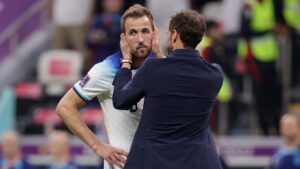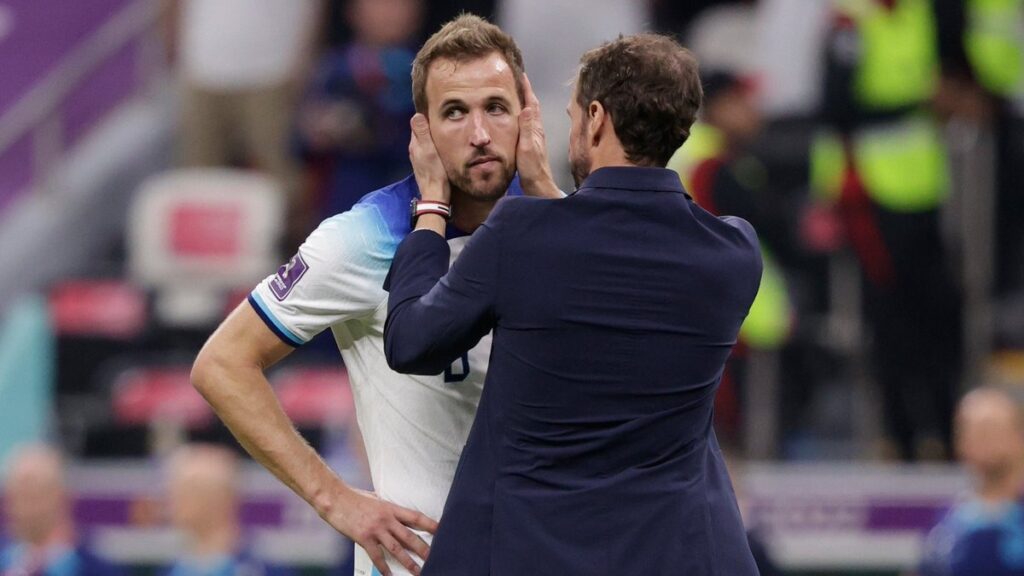This was England’s Chance, and They Blew It
Harry Kane, England’s 29-year-old captain, has never won a trophy. After his penalty miss against France, he and his teammates must front up to the fact that they may never again come so close to glory.
After the final whistle, Jude Bellingham, one of England’s outstanding performers throughout the tournament, lay on the turf, jersey pulled over his face and inconsolable. Those on the sidelines and in commentary boxes spoke of how, at 19, his chance would come again. But life is seldom that simple, and Bellingham, a mature young man, knows it. This was England’s chance, and they blew it.
Michael Owen was 18 when he charmed the watching world with a wonder goal against Argentina in 1998. He would go on to play two more World Cups, without having the same sort of thrilling impact he had as a teenager. Wayne Rooney, his fellow Liverpudlian, was also 18 when scored two goals apiece against Switzerland and Croatia in the group stage of Euro 2004. His pace, power and eye for goal marked him out as the next big thing, but he fractured his foot in the first half of the quarterfinal against Portugal, a game England would go on to lose on penalties.
Rooney would play one more European Championship, in 2012, and three World Cups, but would never have remotely the same impact he had in Portugal in 2004. His World Cup journey, which featured just one goal across three competitions, is best remembered for an ugly stamp on Ricardo Carvalho in the 2006 quarterfinal against Portugal.
Germany’s Thomas Muller scored 5 goals when they got to the semifinals in 2010, and another 5 when they stormed to the trophy four years later. In two World Cups since, he hasn’t managed a single one. That’s football for you, and Bellingham knows better than most that what might seem logical often isn’t so.
There is simply no guarantee that Bukayo Saka and Phil Foden will be as speedy and effective in four years’ time. Or that Bellingham himself will be able to maraud around the pitch as he did this time. It’s certain that Harry Kane, if he’s still in the squad at the age of 33, will be past his best by 2026.
In so many ways, this was England’s perfect moment. A reliable goalkeeper, a back four that had performed well at a major tournament just a year earlier, a midfield that combined experience, youth, energy and graft, and a forward line full of menace. It’s also beyond dispute that England had one of the strongest benches in the competition.
Often though, knockout matches illustrate the importance of history. Teams with a lot of baggage usually succumb to it, while those with a track record of winning prevail even when not playing especially well. England managed to largely shackle Kylian Mbappe, though his surging run played a big part in France’s opening goal. The French defence was ruffled enough to concede two penalties. Olivier Giroud did little apart from missing a great chance, and scoring the decisive goal.
England had much more of the ball, and more shots on target. They were definitely the better team in the second half. But it was France that won. Like a boxer rousing himself after an average display to land a couple of knockout punches, France won the moments that mattered.
World Cups aren’t won on teamsheets. They aren’t always won on the turf either. Often, it’s the mind that decides such contests. When Harry Kane stood on the penalty spot to take the second spot kick, having already lashed one high into the right side of Hugo Lloris’s goal, he would have had multiple thoughts to process in his head.
Lloris has been Tottenham Hotspur’s goalkeeper for over a decade, from the time a young Kane was the bright young hope being loaned out to clubs like Norwich and Leicester. Lloris knows him and his strengths better than any journalist ever will. His weaknesses too. Lloris is also a World Cup winner. Kane hasn’t won a single trophy in his career. He has, however, lost both a European Championship final and a Champions League final. These things can scar you.
Had Kane relinquished penalty-taking duties, he would have been accused of cowardice. So, he went ahead, scored one, and missed the other. Had England managed to draw level with extra time looming, and with the pace and trickery of Jack Grealish introduced off the bench, the game might have swung decisively their way.

But it didn’t. Footballers have a finite time at the top. Only a rare few like Lionel Messi, Cristiano Ronaldo and Karim Benzema manage to stretch that out to a decade and more. For most, the peak lasts less than the period between two World Cups. In Russia four years ago, England were too callow, and reaching the last four was an achievement in itself.
This time, they were primed to go all the way. The exits of Spain and Portugal had opened up the draw for them. France were missing their first-choice centre-midfield pairing of N’Golo Kante and Paul Pogba, while Benzema was ruled out on the eve of the competition. But when it counted, none of that mattered. Marcus Rashford’s last-gasp free kick, which landed on the roof of the French net, summed up England’s campaign. Close, but not near enough. It may be a long time before such an opportunity comes again.




